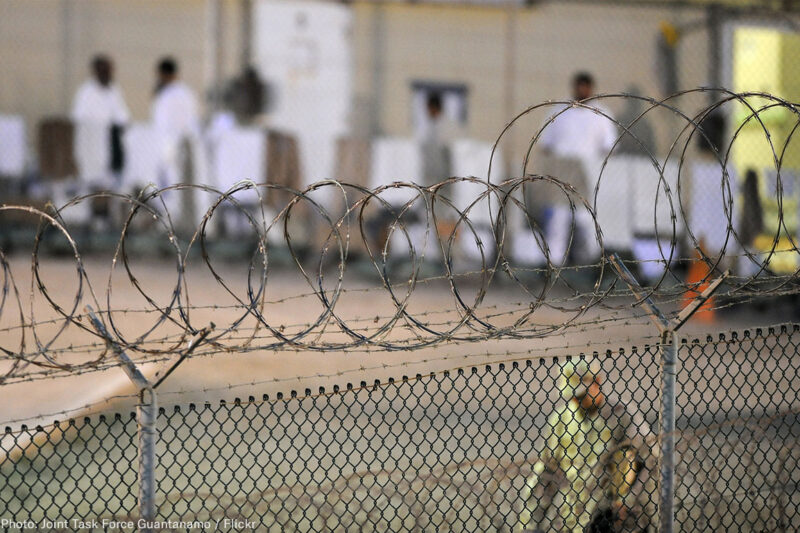
The Guantánamo military commissions, the scheme created by the government to try 9/11 and other detainees, have devolved into an unacceptable and alarming assault on defense lawyers attempting to provide fair representation to their clients.
A new letter, drafted by the ACLU and joined by 150 death penalty lawyers and law professors, registers the capital defense community’s outrage over the legal breakdown, which clearly violates federal and international law.
In the current crisis, Brig. Gen. John Baker, a decorated combat veteran and the second-highest ranking lawyer in the Marine Corps, was sentenced to 21 days of confinement by the presiding military judge in the prosecution of Abd Rahim Hussein Al-Nashiri, a suspect in the 2000 bombing of the USS Cole. Gen. Baker, in his role as the chief defense counsel for the Guantánamo military commissions, had granted a request by Al-Nashiri’s defense counsel to withdraw from the capital case because of an ethical conflict that is secret but is known to involve government monitoring of attorney-client communications. Three of Al-Nashiri’s long-term lawyers then withdrew — including his one attorney qualified to work on death penalty cases. The lawyer left on the case was a junior military lawyer.
The presiding military judge, Col. Vance Spath, was displeased — both that the lawyers had withdrawn and that Gen. Baker granted their dismissal without his permission. How Judge Spath expressed that displeasure is where things went horribly wrong. He found Gen. Baker had acted in contempt of the court, and ordered him to be confined for 21 days. (Gen. Baker spent 48 hours confined to his trailer at “Camp Justice” on the Guantánamo naval base before being released after he filed a federal appeal, which is still pending.) Spath then ordered the young military lawyer with no death penalty experience to proceed with Al-Nashiri’s defense on his own.
Just as you would not expect a recent medical school graduate to perform a complex and risky surgery, you would not assign a junior lawyer without capital experience a leading role in a capital case.
Capital defense is a highly complex and specialized area of law. Both in traditional federal prosecutions and in the unique provisions for Guantánamo, there must be at a minimum two lawyers representing a person facing the death penalty, and at least one lawyer must be “learned counsel,” with distinguished prior experience and knowledge in the area of capital trials. Just as you would not expect a recent medical school graduate to perform a complex and risky surgery, you would not assign a junior lawyer without capital experience a leading role in a capital case.
Richard Kammen, Al-Nashiri’s former long-term capital defense counsel, had been on the case for nine years. He had been practicing law for 46 years and had served as lead capital counsel in numerous cases. In contrast, Al-Nashiri’s remaining defense counsel, Navy Lt. Alaric Piette, is a 2012 law school graduate who meets none of the requirements for “learned counsel.” He was added to the existing Al-Nashiri defense team just a few months ago. He has no prior capital experience, and no prior criminal defense experience with homicide charges. He rightly told the court exactly that.
Judge Spath ordered the young lawyer to represent Al-Nashiri on his own in the scheduled proceedings. The judge’s departure from the rules, which require learned counsel at every part of a capital prosecution, is inexplicable. Even beyond the binding military commission rules, the American Bar Association’s guidelines for capital cases have long explained that the unique and complex labyrinth of capital trial preparation and investigation requires qualified death penalty counsel represent the defendant at every stage of the proceedings. There is no exception to this rule because the expertise is deemed necessary throughout. Nonetheless, Judge Spath suggested that the junior defense counsel should, alone, stand in the place of learned counsel and a team with deep knowledge of the voluminous issues that the case raises. The young lawyer resisted, repeating several times, that he was “not qualified” to represent Mr. Al-Nashiri in the capital pretrial matter without learned counsel.
Judge Spath dismissed the lawyer’s refusal to speak as a trial “strategy,” as if requesting qualified counsel for his client was somehow a personal choice, designed to disrupt the case. The young lawyer pointed out that it was neither his nor his client’s choice: “This cannot be trial strategy. It was not our choice." Judge Spath ordered him to continue anyway.
The judge’s unjustified and reprehensible attack on defense counsel, and his insistence that a major capital trial go forward without experienced counsel, is just the latest in a long string of outrages in the Guantánamo military tribunals. Listening devices in attorney-client meeting rooms have been installed, disguised as smoke detectors. The FBI has infiltrated and investigated defense teams. Privileged legal mail is seized. Sadly, the list goes on.
The tribunals have become a costly farce, inflicting incalculable damage to due process and justice. This farce must end.


